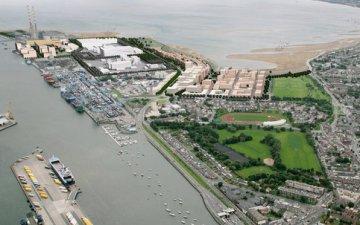What next for the Poolbeg incinerator plan?

Is the Poolbeg incinerator plan actually too small? After the exit of the Greens, the Minister for the Environment is now Éamon Ó Cuív. Within a few weeks we will have another minister in place. What will happen to the issue of the proposed Poolbeg incinerator is anyone’s guess. Sandy Hazel reports.
Most election candidates are saying publicly that the incinerator is a bad plan, but they are in campaign mode and possibly telling the electorate only what it wants to hear. A recent readers’ poll by the Irish Times had 60-40 in favour of the incinerator being built.
Plans to impose levies on the incinerator’s operation, in an effort to make it less viable, were put on hold when John Gormley left government. His Waste Miscellaneous Bill was weeks from being enacted. The Department of the Environment has since said that it will be “for the new Government to decide on whether [the Bill] is taken forward”.
Dubliners however are facing another type of levy if the incinerator does go ahead. If the amount of waste supplied to the incinerator does not reach a quota of 320,000 tonnes per annum, Dublin City Council will be accused of exposing taxpayers to millions of euro in compensation to the operator. Local TD Chris Andrews claimed there could be a potential bill of between €187-350 million over 25 years. “Officials at the most senior levels in the council still don’t seem to get it - Dublin does not need this incinerator," Andrews said.
The incoming Environment Minister will find the Poolbeg incinerator and the Waste Management Bill top of their in-tray. The weight of the waste is the problem.
All agencies are at odds over the tonnage planned. The Government’s waste policy is criticised by the Economic and Social Research Institute (ESRI) which in turn has its waste predictions criticised by an international review. Dublin City Council waste predictions were challenged by Gormley. The company charged with the incinerator operation, Covanta, is quoting a different set of figures and independent waste collectors have their own tonnage data.
Critics say the plant is way oversized and will entail creating more rubbish to fulfil the put-or-pay clause in the contract. A ‘burn everything’ policy will negate the need for recycling says Gormley. He points out that the incinerators in Europe “are looking for waste to fill them”. But is a plant with a capacity of 600,000 tonne a year really too big? Haven’t other infrastructure projects failed because they were planned too small?
A similar facility in Denmark, the Vestforbraending plant, is only one of three incinerators serving Copenhagen, a city similar in size to Dublin. Although the Danes have a good record in recycling (65 per cent of waste), they still have a combined energy from waste capacity of one million tonnes per annum.
Jens Kragholm, incinerator project manager with Covanta, explains the volume argument: “The Greater Dublin area, including Wicklow, Kildare and Meath, is expected to grow and hit two million in the next decade,” says Kragholm. “Irish citizens produce less waste per capita than Danish ones - don’t ask me why - but even if there is a 200,000 tonne per annum energy-from-waste capacity coming into operation in 2011 in Meath, Dublin will need an additional 400,000 tonne capacity over time to manage residual waste after recycling as compared to Copenhagen,” he says.
But won’t the licence only allow for waste collected from the four Dublin local authorities? Dublin City manager John Tierney has vowed that waste will not be imported. Tierney reminded protesting councillors at a recent city council meeting that councillors had in fact previously voted for the Dublin waste management plan, which includes incineration.
Critics of incineration say that ash will also be an issue. Bottom ash is regarded as toxic and would be landfilled here. Flue ash will probably be exported. Covanta plans for ash recovery at the Dublin site, but until then it will go to a EU location for recovery and will replace base material in the construction industry there. Regulation will be required for ash recovery in Ireland, and Covanta would seek an amendment to its licence then.
Any revenue from the electricity generated by will be shared between Covanta and DCC, up to a certain threshold. Above that, the surplus will accrue to DCC.
“Maybe they are just waiting for me to leave office,” says Gormley during this interview, a few weeks before he left government. Watch this space.
A version of this article appeared in NewsFour on February 13
